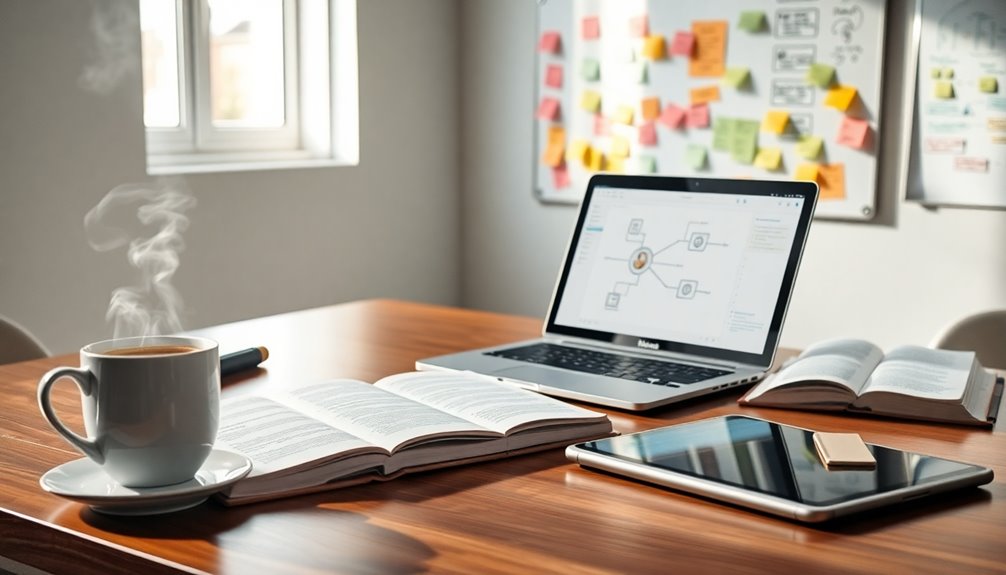To impress during your receptionist job interview, focus on showcasing your strong communication, customer service, and problem-solving skills. Prepare to answer questions about how you handle multitasking, manage conflicts, and create a welcoming atmosphere. Be ready to demonstrate your proficiency with relevant technology like CRM systems and Microsoft Office. Highlight your organizational abilities and provide examples of how you build client relationships. Ultimately, approach the interview with professionalism, asking thoughtful questions to show genuine interest in the role. Keep this in mind, and you'll be well-prepared to stand out among other candidates!
Key Takeaways
- Highlight your strong communication skills, emphasizing how they enhance client interactions and satisfaction.
- Showcase excellent customer service experiences that demonstrate your ability to create a welcoming environment.
- Discuss your problem-solving skills, providing examples of how you efficiently handled unexpected challenges.
- Emphasize your organizational and multitasking abilities, illustrating how you manage multiple tasks in high-pressure situations.
- Prepare thoughtful questions about company culture and professional development opportunities, showing genuine interest in the role.
Key Receptionist Skills

As a receptionist, key skills can make all the difference in your day-to-day interactions. First and foremost, strong communication skills are crucial; you need to convey information clearly and professionally to clients and team members. Your role in providing excellent customer service creates a welcoming atmosphere that encourages clients to feel valued and supported.
Problem-solving skills come into play when you face unexpected challenges. You'll need to assess situations quickly and develop practical solutions while keeping your composure under pressure. Interpersonal skills are equally important, as they help you build rapport with both clients and colleagues, fostering a sense of trust and collaboration in the workplace.
In addition to these soft skills, proficiency in multitasking is essential. You'll often juggle phone calls, greet visitors, and handle administrative tasks simultaneously. Strong organizational skills will help you prioritize your workload and guarantee efficient office operations. By honing these key receptionist skills, you'll not only improve your performance but also enhance the overall experience for everyone who walks through your door.
Effective Communication Techniques

Effective communication techniques are essential for receptionists to excel in their roles. You need to master clear and concise communication to guarantee accurate information delivery and foster positive relationships with clients. When you use active listening skills, you can better understand client needs and address inquiries promptly, which enhances overall customer satisfaction.
Non-verbal communication also plays a significant role. Maintaining eye contact and displaying positive body language can engage visitors effectively. By adapting your communication style to suit various audiences—whether formal or casual—you'll find it easier to build rapport and create a welcoming environment.
Professionalism is key in every interaction. By using an appropriate tone and language, you build trust with clients and reflect positively on your company's image. Remember, your ability to communicate effectively not only impacts client experiences but also influences the overall perception of your workplace. Additionally, participating in online communities can provide valuable feedback and support to enhance your communication skills.
Customer Service Strategies

Creating a welcoming atmosphere is vital for receptionists aiming to boost customer satisfaction. By focusing on effective customer service strategies, you can greatly enhance customer interactions. Studies show that a warm environment can increase satisfaction rates by up to 70%. Active listening is essential; it helps you understand customer needs and resolve inquiries promptly, cutting complaint resolution time by 50%.
Incorporating personalized service builds long-term relationships and can boost customer retention by 20%. Here's a quick view of vital strategies:
| Strategy | Impact on Customer Satisfaction | Tools/Techniques |
|---|---|---|
| Create a Welcoming Space | +70% | Friendly greetings |
| Active Listening | -50% complaint resolution time | Empathy in responses |
| Personalized Service | +20% retention | Tailored interactions |
| Structured Follow-Up | Improved loyalty | CRM systems |
| Efficient Inquiry Management | Streamlined interactions | CRM systems |
Utilizing CRM systems allows you to manage customer interactions efficiently, ensuring you keep accurate records. Embrace these strategies to elevate your service quality and foster a loyal customer base. Additionally, integrating with a CRM system can enhance targeting and personalization, further improving customer engagement.
Problem-Solving Approaches

A receptionist's role extends beyond fostering a welcoming atmosphere; it also requires strong problem-solving skills to guarantee smooth operations. When faced with issues, you need to quickly assess the situation and identify practical solutions. Effective problem-solving approaches involve using your communication skills to gather necessary information from clients, ensuring that you understand their needs and can address problems promptly.
Maintaining composure under pressure is vital. It allows you to think clearly and develop solutions, even in challenging situations. If you encounter a complex issue that exceeds your immediate capabilities, don't hesitate to consult with colleagues or supervisors. They can provide valuable insights that help resolve the problem more effectively.
Taking proactive approaches to potential problems can greatly enhance efficient operations. For instance, anticipating client needs or managing scheduling conflicts ahead of time prevents issues from arising. By integrating these strategies into your daily routine, you'll not only improve your problem-solving skills but also contribute to a more organized and responsive front desk environment. Embrace these techniques, and you'll be well-equipped to impress in your receptionist role.
Handling Difficult Situations

Handling difficult situations is an essential skill for any receptionist. You need to communicate effectively, show empathy, and apply problem-solving strategies to turn challenges into positive outcomes. Let's explore how these techniques can help you manage upset customers and maintain a professional atmosphere.
Effective Communication Techniques
Effective communication is vital when dealing with difficult situations as a receptionist. Mastering this skill not only helps you manage conflicts but also enhances the overall customer experience. Here are three key techniques to employ:
- Active Listening: Focus on understanding the customer's concerns without interruption.
- Calm and Professional Tone: Maintain composure, even when tensions rise.
- Documenting Complaints: Keep accurate records of issues and resolutions for future reference.
By utilizing active listening, you can fully grasp what the customer is upset about and respond appropriately. It's essential to acknowledge their feelings with empathy, which helps build rapport and shows you care. When you speak in a calm and professional tone, it can de-escalate conflicts and lead to a more constructive dialogue.
Don't hesitate to document complaints and resolutions; this practice not only assists in following up with customers but also provides insights for improving service delivery. If a situation exceeds your capability, seeking managerial support guarantees that the customer receives the best possible resolution while you maintain professionalism. Effective communication is your key to steering through these challenging moments successfully. Additionally, understanding emotional dysregulation can help you navigate interactions with upset customers more effectively.
Empathy and Understanding
Steering through difficult situations with upset customers requires a deep sense of empathy and understanding. When you truly connect with their feelings, you can address their concerns more effectively. By putting yourself in their shoes, you can identify the root cause of their distress, which is essential for effective problem-solving.
Active listening is critical in these moments. By acknowledging the customer's feelings and validating their concerns, you can de-escalate tense situations. A calm demeanor is equally important; it sets a positive tone, encouraging cooperation and fostering a constructive dialogue. Remember, your response can considerably influence the outcome of the interaction.
Once you've resolved the issue, don't forget to follow up. This shows your commitment to customer satisfaction and reinforces the trust you've built. Following up not only demonstrates that you care but also helps in building relationships that last. By prioritizing empathy and understanding, you create an environment where customers feel valued, ultimately enhancing their overall experience. This approach not only addresses immediate concerns but also lays the foundation for long-term loyalty, ensuring that customers return when they need assistance in the future.
Additionally, fostering a sense of unconditional love in customer interactions can lead to a more supportive and understanding atmosphere.
Problem-Solving Strategies
Steering through difficult situations with upset customers requires a strategic approach to problem-solving. To impress during your receptionist interview, you should highlight your ability to manage stress and effectively resolve issues. Here are some key problem-solving strategies:
- Maintain a calm demeanor to defuse tension.
- Use active listening skills to guarantee customers feel heard.
- Document complaints for thorough follow-up.
When faced with an upset customer, focus on understanding their concerns. Demonstrating empathy can go a long way in calming the situation. Utilize your active listening skills to grasp the issue fully and make the customer feel valued. Next, assess the situation quickly and develop tailored solutions that address their needs.
If the problem exceeds your capability to resolve, don't hesitate to involve management while maintaining professionalism. Practicing de-escalation techniques, such as using polite language and reassuring the customer that their concerns will be addressed, fosters a positive resolution. By showcasing these problem-solving strategies, you'll not only impress during your receptionist interview but also prove that you can handle stress effectively in challenging situations. Additionally, successful couples often emphasize the significance of communication as key, which can also be applied to effectively resolving customer issues.
Organizational Skills and Methods

When you're in a receptionist role, effective task management is key to keeping everything running smoothly. Streamlined filing systems, both digital and physical, not only help you find documents quickly but also support your overall productivity. Let's explore how these organizational skills can set you apart in your job interview. Regularly maintaining cleaning efficiency in your workspace can also enhance your organizational skills and overall office environment.
Effective Task Management
Effective task management is crucial for a receptionist, as it guarantees that urgent responsibilities are prioritized and addressed promptly. By mastering this skill, you can enhance your organizational skills and maintain workflow efficiency. Here are some key strategies to reflect upon:
- Use task management software to keep track of deadlines and appointments.
- Regularly review and adjust your priorities to adapt to changing demands.
- Develop routines for daily tasks to maintain focus and organization.
To effectively prioritize tasks, identify which responsibilities are urgent and important, ensuring that critical duties are addressed first. Tools like calendars and to-do lists can greatly aid in managing your workload. Remember to set aside specific times for checking emails or returning calls, as this can reduce the likelihood of overlooking essential responsibilities.
Implementing structured filing systems will also streamline your workflow, allowing for easy retrieval of information when needed. By adopting these effective task management techniques, you'll not only enhance your performance as a receptionist but also contribute positively to the overall office organization. Additionally, consider establishing clear savings goals to manage your finances effectively, which can help reduce stress and improve focus at work. Stay flexible, focused, and organized to excel in your role!
Streamlined Filing Systems
A well-organized filing system acts like a roadmap for your office, guiding you to the information you need without unnecessary delays. By implementing a streamlined filing system, you can reduce document retrieval time by up to 50%, markedly enhancing overall office efficiency. Utilizing document management software and cloud storage can make accessing and organizing files easier than traditional paper methods.
To improve organization, categorize files into clear, consistent folders based on project, department, or date. This approach not only keeps everything in order but also minimizes the risk of losing important documents. Establishing a standardized naming convention for files and folders is vital—it guarantees consistency and aids quicker searches, boosting productivity for everyone involved.
Don't forget the importance of regular reviews. Purging outdated files helps maintain a manageable filing system and prevents clutter, which is fundamental for an orderly workspace. A streamlined filing system is more than just neatness; it's about creating an environment where you and your team can operate efficiently. By adopting these strategies, you'll set yourself up for success as a receptionist and positively impact the entire office. Additionally, regular maintenance of your filing system can improve overall office efficiency and ensure that all team members can quickly find essential documents.
Multitasking in High-Pressure Environments

In high-pressure environments, receptionists often juggle multiple tasks at once, making multitasking an essential skill. You're not just answering phone calls; you're also managing visitors and handling administrative tasks. Here are a few key aspects to bear in mind:
- Efficient task prioritization: Know what needs immediate attention.
- Strong organizational skills: Keep everything in order to avoid chaos.
- Use of scheduling software: Streamline your daily tasks for better efficiency.
Effective multitasking means you'll need to switch between managing urgent client inquiries and ensuring other visitors are greeted promptly. Research indicates that multitasking can reduce productivity by up to 40%, so it's vital to adopt structured strategies, like creating to-do lists, to maintain focus under pressure.
Moreover, leveraging technology, such as scheduling software and CRM systems, can greatly boost your multitasking abilities. These tools help streamline administrative tasks, reduce cognitive load, and enhance service quality. By honing your multitasking skills, you'll not only meet the demands of a high-pressure environment but also impress potential employers with your ability to maintain composure and efficiency.
Technology Proficiency

In today's receptionist role, being tech-savvy is a must. You'll need to master software like Microsoft Office, communicate effectively through tools like Google Workspace, and manage data accurately to keep everything running smoothly. Additionally, having a strong understanding of merchant account credit processing can enhance your ability to support payment-related tasks in the office. Let's explore how these skills can set you apart in your interview.
Software Skills Overview
Proficiency in essential software tools is key for success as a receptionist. A strong foundation in these applications not only makes your daily tasks easier but also impresses potential employers. Here are three important areas to focus on:
- Microsoft Office Suite: Mastering Word, Excel, and PowerPoint is vital for document preparation, data management, and creating presentations.
- CRM Systems: Familiarity with platforms like Salesforce and Zoho helps you maintain client records and track interactions effectively.
- Typing Speed: A speed of at least 75 words per minute boosts your efficiency in data entry and written communication.
Additionally, understanding digital communication tools, such as Google Workspace and Asana, enables you to collaborate seamlessly with your team. With cybersecurity protocols in mind, you'll need to safeguard sensitive information and guarantee compliance with data protection regulations. By honing these software skills, you'll not only enhance your productivity but also position yourself as a reliable and tech-savvy candidate in the competitive job market. Emphasizing your proficiency in these areas during interviews can set you apart from other applicants.
Communication Tools Familiarity
Effective communication tools are fundamental for any receptionist, as they facilitate smooth interactions with clients and colleagues alike. In your receptionist role, familiarity with various communication technologies can greatly enhance your effectiveness. You'll need to master telecommunication systems, including PBX and VoIP, to manage incoming and outgoing calls efficiently.
Proficiency in Microsoft Office Suite is also imperative. You'll frequently create documents, manage data, and prepare presentations using Word, Excel, and PowerPoint. Additionally, experience with CRM systems like Salesforce or Zoho will help you track client interactions and maintain accurate records, which is essential for building strong relationships.
For scheduling appointments, being competent with tools like Google Workspace, Asana, or Trello is important. These scheduling and project management tools will improve your organizational efficiency and task prioritization, ensuring nothing slips through the cracks. Finally, understanding cybersecurity protocols is crucial for safeguarding sensitive information and complying with data protection regulations. By showcasing your familiarity with these communication tools during your interview, you'll demonstrate that you possess the technological proficiency necessary for a successful receptionist.
Data Management Accuracy
Accurate data management is essential for a receptionist, as it directly impacts your ability to maintain reliable records and provide exceptional service. Mastering this skill involves more than just typing; it requires a blend of technology proficiency and attention to detail. Here are some key points to reflect on:
- Proficiency in CRM systems and Microsoft Excel guarantees you keep accurate records.
- Regular updates and double-checking data entry help protect confidential information.
- Familiarity with organizational tools enhances efficiency and retrieval of important documents.
To guarantee data accuracy, you need to develop a consistent routine of updating records and verifying entries. Aim for a typing speed of at least 75 WPM to facilitate quick and precise documentation. Additionally, understanding cybersecurity protocols is critical for safeguarding client data and preventing unauthorized access. By leveraging digital filing systems and task management tools, you can streamline your workflow and maintain high standards of data management. Remember, your ability to manage data accurately not only reflects your professionalism but also enhances the overall operation of the organization you represent.
Displaying Professionalism

In any receptionist role, displaying professionalism is essential for creating a positive first impression. Your demeanor, communication style, and approach to tasks all contribute to how visitors perceive the company. By maintaining a polished appearance and using a professional tone, you foster trust and respect among clients and colleagues.
Here's how you can exemplify professionalism:
| Professional Traits | Impact on Receptionist Role |
|---|---|
| Polished Appearance | Creates a strong first impression |
| Professional Communication | Fosters trust and respect |
| Strong Organizational Skills | Manages schedules and maintains order |
| Active Listening | Understands client needs, shows respect |
| Composure in Difficult Situations | Enhances a positive work environment |
Demonstrating strong organizational skills by being punctual and keeping the front desk orderly reflects your commitment to professionalism. Additionally, active listening allows you to better understand client needs, enhancing communication. When faced with difficult situations, handling them with composure and empathy showcases your professionalism, ultimately contributing to a positive work environment. Your ability to balance these elements will leave a lasting impression on everyone you interact with.
Building Client Relationships

Building client relationships is essential for ensuring client satisfaction and fostering loyalty. Here are three key strategies to help you excel:
- Practice active listening: Pay attention to clients' needs and concerns, showing that you value their input.
- Communicate clearly: Deliver information in a concise manner, ensuring clients feel informed and respected.
- Show empathy and professionalism: Address complaints with understanding, turning potential conflicts into opportunities for deeper connections.
By implementing these strategies, you can enhance the client experience considerably. Active listening allows you to identify issues and respond effectively, while clear communication fosters trust. A welcoming atmosphere, combined with tailored solutions, can elevate client satisfaction and encourage long-term loyalty.
Additionally, consider how pet therapy can be integrated into your organization to improve overall client well-being and satisfaction. Don't forget the importance of follow-ups. Checking in on unresolved issues shows your commitment to their care and strengthens relationships over time. When clients feel heard and understood, they're more likely to return and refer others. Remember, the way you handle interactions sets the tone for the entire organization, so always endeavor to be professional and empathetic in every exchange.
Preparing for the Interview

As you prepare for the interview, your ability to build client relationships will play a significant role in showcasing your fit for the receptionist position. Start by researching the company's mission and values, as well as any recent news. This understanding will help you align your responses with the organization's goals, demonstrating genuine interest.
Next, review the job description thoroughly to identify the specific skills and experience the employer is seeking for the receptionist's role. Prepare for common interview questions and answers, focusing on how you prioritize tasks and handle difficult customers. This preparation will showcase your understanding of the role and your readiness to tackle challenges.
Practice articulating your experiences concisely, highlighting relevant accomplishments that match the job requirements. Mock interviews or role-playing scenarios can boost your confidence and help refine your responses. Remember, your ability to communicate effectively is essential; it reflects how you'll interact with clients and colleagues. By taking these steps, you'll be well-equipped to impress your interviewer and demonstrate your suitability for the position.
Questions to Ask Employers

It's essential to ask thoughtful questions during your interview to illustrate your genuine interest in the receptionist position and the company. Consider these impactful topics:
- Company culture: Understand the work environment and guarantee it aligns with your values.
- Challenges in the role: Gain insights into what you'll face and how you can effectively contribute.
- Professional development: Show your commitment to growth and skill enhancement.
When you think about questions to ask employers, focus on how your role fits within the larger team dynamics. Ask about the team structure and how collaboration happens within the organization. This not only highlights your enthusiasm to integrate but also helps you assess if it's a good fit for you.
Additionally, inquire about the performance metrics used to evaluate success in the receptionist role. This indicates your focus on achieving results and your desire to meet or exceed those expectations. By asking these questions, you position yourself as a proactive candidate, keen to understand the challenges, culture, and opportunities within the company.
Frequently Asked Questions
What Is the Best Answer for a Receptionist Interview?
When answering a receptionist interview question, focus on your strong communication skills. Share examples of how you've effectively resolved client inquiries. Highlight your multitasking abilities by detailing how you manage multiple tasks in a busy environment. Mention your proficiency with software tools like Microsoft Office and CRM systems. Finally, discuss your professionalism in handling difficult customer interactions, emphasizing your commitment to confidentiality and trust, which are essential in a receptionist role.
How Can I Impress My Receptionist Interview?
Did you know that first impressions are formed within just seven seconds? To impress during your receptionist interview, start by researching the company's values and culture. Tailor your answers to reflect that understanding. Share specific examples showcasing your communication and problem-solving skills. Practice responses to common questions, and emphasize your adaptability to new technologies. Dress professionally and maintain a positive demeanor to create a lasting impression that aligns with the receptionist role.
How to Win a Receptionist Interview?
To win a receptionist interview, you'll want to show your enthusiasm and understanding of the company. Research its values and culture to tailor your answers. Prepare specific examples that highlight your communication and organizational skills. Practice responding to common scenarios you might face, demonstrating your problem-solving abilities. Finally, emphasize your adaptability with technology and your commitment to fostering positive relationships, which are essential for creating a welcoming atmosphere.
Why Should We Hire You as a Receptionist Answer?
You might think a receptionist just answers phones, but it's so much more than that! You bring strong communication skills that create a warm atmosphere, making clients feel valued. Your organizational talents shine as you juggle multiple tasks seamlessly. You're dedicated to high-quality customer service, always ready to solve problems and build relationships. Plus, your adaptability to new tech means you're constantly improving efficiency. You've got the experience and passion to excel in this role!
Conclusion
To sum up, acing your receptionist job interview requires showcasing your skills and confidence. Imagine walking into an interview where you turn a tough question about handling an angry client into a compelling story of how you calmly resolved a similar situation, leaving the customer satisfied. By preparing thoroughly and demonstrating your ability to communicate effectively, you'll not only impress your potential employer but also set the stage for a successful career in reception. Good luck!
Felicity, our Author, pens in-depth articles and guides that delve into the heart of personal discovery. Her narrative-driven approach weaves together theory, practice, and personal anecdotes, making the journey of self-exploration both relatable and inspiring. Felicity’s contributions help illuminate the path for those seeking a deeper understanding of themselves and their relationships.










